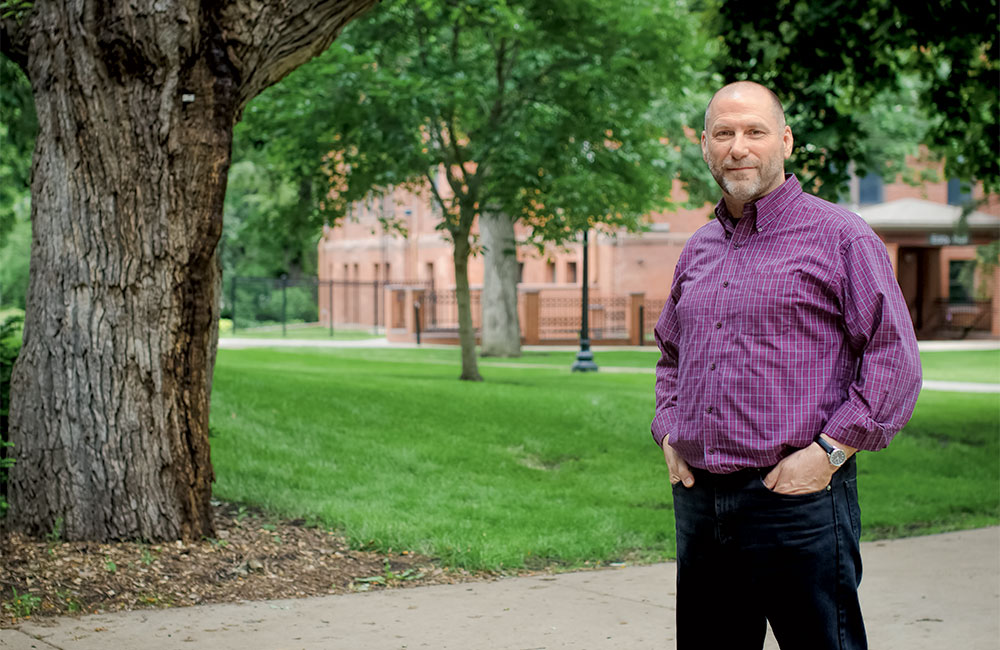Growing up in a Washington, D.C., suburb, Bob Poch was surrounded by monuments, museums, and sites of historical significance. Each Saturday his father eagerly guided Poch and his older brother on tours of nearby treasures. Ford’s Theater enthralled eight-year-old Poch.
“I was looking at Lincoln’s clothing and hearing my father’s emphatic affirmations—‘This is real. This is where it happened. This isn’t fake,’” Poch recalls. That moment triggered his passion for history, but it would be years before he considered history as a career path. College wasn’t even part of his plans—he wanted to be a professional drummer.
Fortunately for Poch’s past, current, and future students, his father persuaded him to try college for two years. Today he is a senior fellow in the Department of Postsecondary Teaching and Learning. This year he received the University’s Morse-Alumni Award for Outstanding Contributions to Undergraduate Education.
It was civil war historian and educator Charles Poland who radically altered Poch’s plans. Poland pulled Poch aside at the end of his first college semester with a prophecy. “I think you can do what I do,” Poland predicted.
Poch’s two-year trial turned into nine straight years of study. He earned an M.A. followed by a doctorate in higher education at the University of Virginia.
During an internship in the provost’s office, Poch grew passionate about educational access and realized he could apply his understanding of history, specifically issues of privilege, to educational policy issues. His desire to shape educational policy and reverse historical trends regarding educational access landed him a position, right out of graduate school, with the South Carolina Commission on Higher Education.
“I was an outsider, a young white guy looking for ways to reverse the effects of Jim Crow and increase the college-going rate of South Carolinians,” Poch says. “Luckily, I had great mentors who taught me how to understand diverse perspectives and contexts, and effectively engage people. It was a crash course in multiculturalism and respect.”
With those interpersonal lessons and Poch’s natural warmth and exuberance, he was embraced by his colleagues, he says. Many became lifelong friends.
Removing barriers
Eight years later, Minnesota called, and Poch became director of what is now the Office of Higher Education, whose mission to remove barriers to postsecondary attendance aligned completely with his previous experience and values.
“Watching thousands of students going into colleges and universities who, without the commitment of the state behind them, would not have gone was absolutely thrilling,” he reflects.
When Poch began guest lecturing at the University, his love of teaching was reignited. He eventually joined the faculty as assistant dean of General College. Now he harmonizes pedagogy, history, and access, taking his research directly into the classroom.
Poch’s investigation of Howard University law school’s consistent development of pioneering civil rights attorneys, such as Thurgood Marshall, is his foundation for scenario-based history problems shown to increase undergraduates’ subject knowledge and cognition. He is also the new director of graduate studies for the nascent master of arts in multicultural college teaching and learning.
“Our program prepares future and current professionals to skillfully and productively engage diverse audiences within colleges and universities,” says Poch. “We believe you can harness all forms of diversity to maximize educational experiences and outcomes.”
Poch still plays the drums, and his office is decorated in early American Beatlemania as well as scholarly tomes. The decades-old advice he received from Poland continues to fuel his contagious enthusiasm.
“I love what I do,” he says. “This is a joyful thing for me.”
Read more about Bob Poch and the Department of Postsecondary Teaching and Learning.
Story by Wendy Russ Robson | Fall 2014
